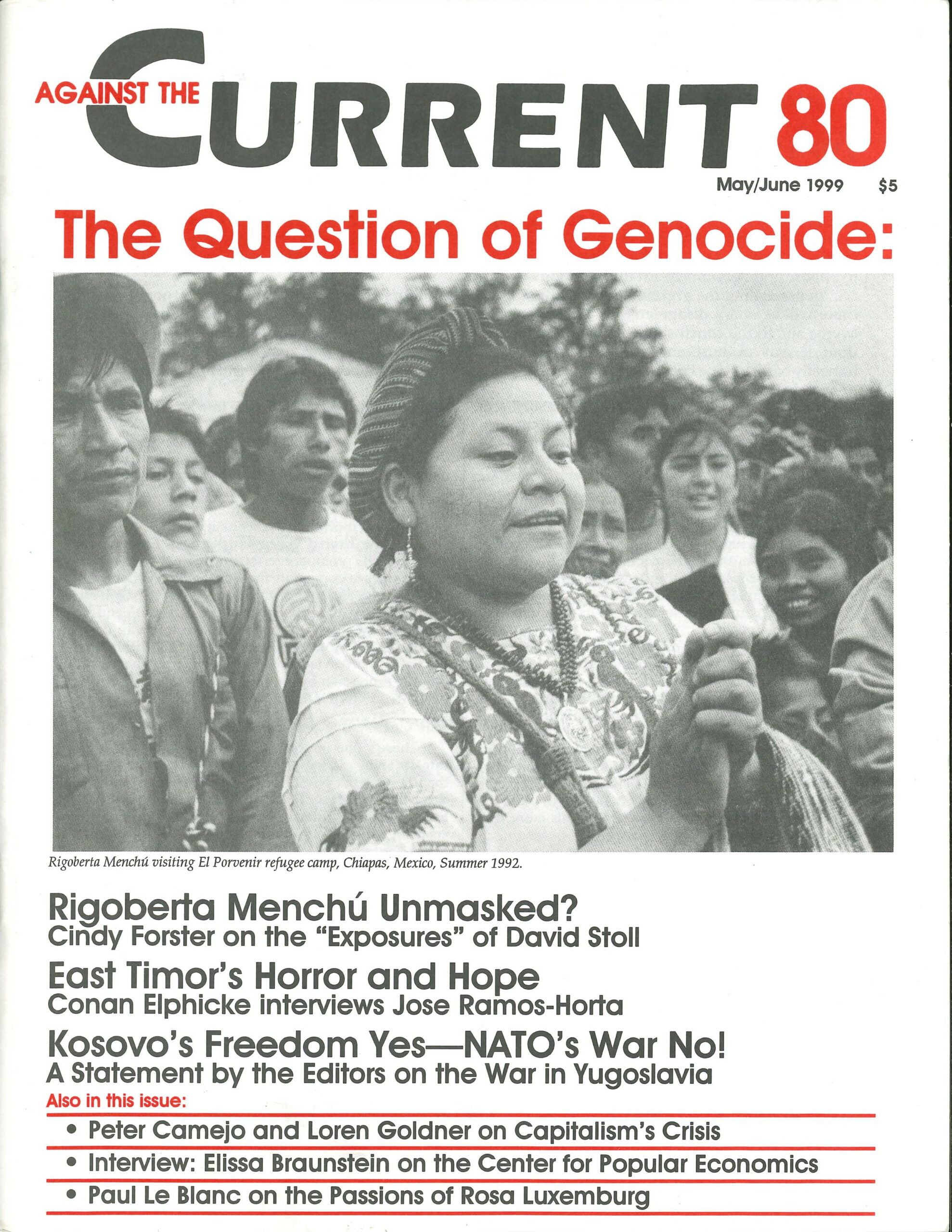Against the Current, No. 80, May/June 1999
-
NATO's Road to War and Ruin
— The Editors -
Waiting to Inhale: Culture Wars or Unfinished Gratification?
— David Roediger -
The Fight for Leonard Peltier
— Hayden Perry -
CPE: Demystifying Economics--Interview with Elissa Braunstein
— Stephanie Luce -
Race and Politics: Indonesia's Ethnic Conflicts
— Malik Miah -
A Profile of East Timor's Jose Ramos-Horta
— Conan Elphicke -
Rigoberta Menchú: A Witness Discredited?
— Cindy Forster -
A Revolutionary Woman in Mind and Spirit: The Passions of Rosa Luxemburg
— Paul Le Blanc -
Random Shots: Weird Sex and Boiled Bacon
— R.F. Kampfer -
The Rebel Girl: A Question of Rape
— Catherine Sameh - Capital's Global Turbulence: A Symposium
-
"Total Capital" Rigor and International Liquidity: A Reply to Robert Brenner
— Loren Goldner -
The Great Bull Market vs. Looming Crisis: On Brenner's Theory of Crisis
— Peter Camejo - Dialogue on Workers in a Lean World
-
On Workers in A Lean World
— Kim Moody -
A Rejoinder
— Ralph Armbruster-Sandoval - Reviews
-
Glaberman and Faber's Working for Wages
— Sheila Cohen -
The Availability of Utopian Thought
— Terry Murphy - Letters to Against the Current
-
Letter and Response on Mumia Abu-Jamal
— Sidney Gendin and Steve Bloom - In Memoriam
-
Comrade and Friend: Bob Strowiss 1919-1999
— Edmund Kovacs
Sidney Gendin and Steve Bloom
Letter to the Editors
STEVE BLOOM SUCCEEDS in making a very persuasive case in the January-February issue of Against the Current that the trial of Mumia Abu-Jamal was an outrage against justice.
On the other hand, your case in behalf of Mumia rests on a conspiracy in which the police and the district attorney’s office collaborated. I find your theory believable, but missing one important element which you really need to address.
If the police themselves believe Mumia is innocent, then they believe someone else is guilty. But we all know that, much as the police may have hated Mumia, police everywhere-including those in Philadelphia-hate “cop killers” most of all.
While the police may be happy to have Mumia executed for a crime he did not do, they must be more miserable about shutting the case down on the real killer than they are to “punish” Mumia. What motivates them to let the killer go free? Your article says not one word about that. Really, you do owe us at least a small explanation.
—Sidney Gendin
Eastern Michigan University
Steve Bloom responds:
I ADMIT THAT I have never really been able to understand the police mind. Nevertheless it seems to me there are two possibilities.
One is that the police and prosecutors really do believe Mumia to be guilty, even if they may have “embellished” the facts a bit in order to ensure his conviction. That would, after all, be a normal enough police practice.
My guess is that this is probably the viewpoint of the widow, Maureen Faulkner, and many ordinary members of the Fraternal Order of Police who choose to ignore the discrepancies in the case and insist on Mumia’s execution.
The other possibility is more intriguing, and we do need to consider it seriously. It would explain why, for example, no forensic tests were done that night to see if Mumia had fired a gun, or if his gun had been fired.
These procedures are both routine and elementary, which suggests that they might have been consciously omitted in order to avoid gathering any evidence that might prove Mumia’s innocence. This, in turn, would strongly indicate that those in charge of the “investigation” at the scene knew, or suspected, that he was innocent—and didn’t care.
But Sidney Gendin is correct: They would have had no interest in allowing a “cop killer” to simply walk free. Based on information from Mumia’s attorneys, all indications are that the actual shooter was the second person in the Volkswagen with Mumia’s brother when officer Faulkner stopped the car.
We now know that the cops did trace this individual, who was subsequently found dead of a drug overdose. And although it is purely speculative, a reasonable person could suspect that the police simply decided to have their cake and eat it too-finding a way to get rid of both the perpetrator and Mumia Abu-Jamal.
—Steve Bloom
New York
ATC 80, May-June 1999

